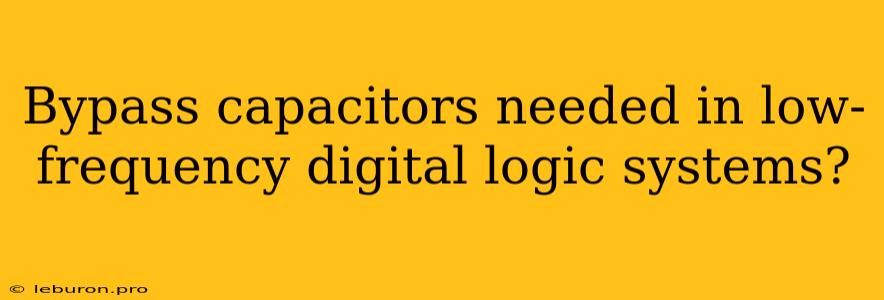In the realm of digital logic systems, where signals fluctuate rapidly, the proper management of power supply noise is crucial for reliable operation. While the role of bypass capacitors in high-frequency circuits is well-established, their necessity in low-frequency digital logic systems might be less clear. This article delves into the complexities of power supply noise and its impact on low-frequency digital logic, analyzing the need for bypass capacitors and the factors influencing their selection.
Understanding Power Supply Noise in Digital Logic
Digital logic circuits are comprised of switching elements that transition between high and low voltage levels, representing binary states. These transitions draw current pulses from the power supply, resulting in voltage fluctuations known as power supply noise. These fluctuations can corrupt the digital signals, causing malfunctions and errors in the system.
Sources of Power Supply Noise
- Switching transients: The abrupt current changes during signal transitions create voltage drops across the power supply impedance, leading to transient noise spikes.
- Ground bounce: As current flows through ground paths, voltage drops occur, especially when multiple components share a common ground.
- Electromagnetic interference (EMI): External sources of electromagnetic radiation can induce noise into the power supply lines.
The Impact of Power Supply Noise on Low-Frequency Digital Logic
While high-frequency digital systems are more susceptible to noise due to rapid switching speeds, low-frequency circuits are not entirely immune. Even in low-frequency applications, power supply noise can:
- Introduce timing errors: Noise spikes can cause delays in signal transitions, potentially affecting the timing of logical operations.
- Lead to glitches: Transient noise can momentarily pull a signal to an unintended logic level, resulting in spurious output pulses.
- Increase power consumption: Noise can cause components to switch unnecessarily, increasing power consumption.
- Reduce signal integrity: Noise can distort the signal waveform, making it difficult to interpret the intended logic levels.
The Role of Bypass Capacitors in Low-Frequency Systems
Bypass capacitors are essential for mitigating power supply noise by acting as local reservoirs of charge. They provide a low-impedance path for the transient currents generated during signal transitions, preventing them from reaching the main power supply lines and disrupting other components.
In low-frequency digital logic systems, bypass capacitors are still needed, although their size and type may differ from those used in high-frequency systems:
- Reduce noise coupling: Bypass capacitors help to decouple the noisy components from the clean power supply, preventing noise propagation throughout the system.
- Minimize ground bounce: Bypass capacitors can effectively reduce ground bounce by providing a local path for the ground currents, preventing voltage drops.
- Improve signal integrity: Bypass capacitors contribute to a cleaner power supply, improving signal integrity and reducing the likelihood of timing errors and glitches.
Factors Influencing Capacitor Selection
- Frequency: The operating frequency of the system influences the capacitor value. Higher frequencies require smaller capacitor values for effective noise suppression.
- Current draw: The current demand of the circuit determines the capacitor's capacitance. Higher current draws necessitate larger capacitance values.
- Capacitor type: Different types of capacitors, such as ceramic, tantalum, and electrolytic, offer varying characteristics in terms of capacitance, impedance, and voltage rating.
- Location: Bypass capacitors are typically placed close to the noisy components, minimizing the length of the noise path and reducing the impact of parasitic inductance.
Conclusion
While the need for bypass capacitors may not be as critical in low-frequency digital logic systems compared to high-frequency systems, they remain essential for ensuring proper operation. By effectively attenuating power supply noise, bypass capacitors contribute to improved signal integrity, reduced timing errors, and minimized power consumption. Careful selection of capacitor value, type, and location is crucial for optimal performance and reliability in low-frequency digital circuits.
